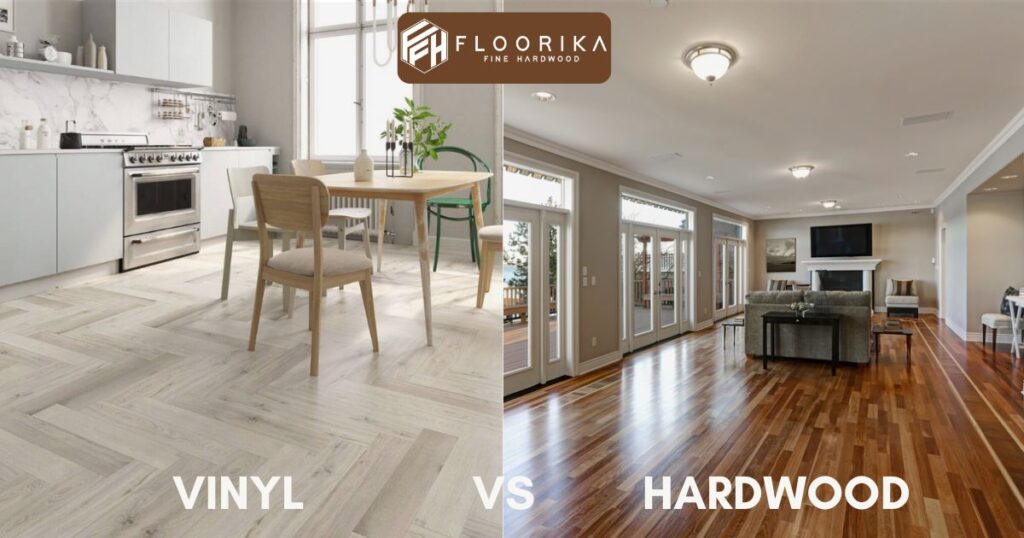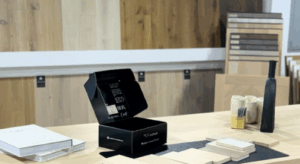Flooring is an essential selection. It establishes the tone for the whole room, influencing aesthetics and daily activities. But with several options, deciding between the beauty of hardwood floors and the comfort of vinyl flooring may be like wandering a maze.
Let us review the advantages and disadvantages of vinyl and hardwood flooring. Assess longevity, upkeep, cost, and stylistic diversity. Prepare yourself to make a smart choice, bringing your ideal home from plan to reality.
Vinyl Flooring
Vinyl flooring is a durable and economical alternative that replicates natural materials such as wood or stone. It is made up of many layers, including a polyvinyl chloride (PVC) core for stability, a design layer to provide the desired look, and a wear layer for protection.
Here’s why vinyl flooring is a tough contender in the flooring battle:
- Durability
Vinyl is made to resist regular wear and tear. Its tough surface can withstand high-traffic areas and even the occasional dropped toy without showing signs of wear.
- Water Resistance
Unlike hardwood, vinyl is very resistant to wetness. Spills and splashes collect on the surface, making it excellent for kitchens, baths, and laundry rooms.
- Cost-Effectiveness
Vinyl is less expensive than hardwood. This makes it an appealing choice for budget-conscious households and those covering large areas.
- Easy Maintenance
Vinyl is very easy to keep clean. To keep it looking good, gently sweep it regularly and wash it with a light cleaning solution on occasion.
But not every vinyl flooring is made equal. Consider thickness, wear layer quality, and the installation process while making your decision. Understanding its qualities and benefits will help you determine whether vinyl is the best-fit flooring for your needs and lifestyle.
Also Read: Types of Vinyl Flooring Explained
Hardwood Flooring
Hardwood flooring represents traditional elegance and enduring beauty. Crafted from boards of natural wood, it displays warmth and character, instantly raising the atmosphere of any place. Each piece has a unique grain pattern and slight color variations. It can make your floor a one-of-a-kind work of art.
Aside from its looks, hardwood has several advantages:
- Durability
When properly maintained, hardwood is long-lasting. Solid hardwood may even be sanded and polished numerous times during its lifetime. It allows you to update its appearance to reflect changing trends or just freshen its surface.
- Longevity
Hardwood may survive for decades or even centuries if properly maintained. This improves the market value of your property, making it a wise investment.
- Refinishing Possibility
Hardwood’s ability to be refinished is a huge benefit. It allows you to adjust the stain color or finish to reflect changing interior trends or personal preferences.
Hardwood requires more initial investment and maintenance than vinyl flooring. But its longevity, natural beauty, and ability to increase the value of your home make it an appealing option.
Also Read: Benefits of Natural Hardwood Flooring for Homes
Weighing the Environmental Impact: Vinyl vs. Hardwood
While aesthetics and functionality are essential, making an informed decision also requires considering the environmental effect of your flooring choice.
- Vinyl flooring
Traditional vinyl is made of PVC. It is a nonrenewable material made from fossil fuels. Vinyl manufacturing can emit toxic volatile organic compounds (VOCs), which contribute to air and water pollution. Furthermore, disposing of unwanted vinyl flooring may be difficult. Because it usually ends up in landfills and takes generations to degrade.
The good news is that the vinyl industry is changing. Look for environmentally friendly vinyl created from recycled content or bio-based materials such as bamboo or cork. These choices have a lower environmental impact than standard PVC vinyl.
- Hardwood flooring
Unsustainable activities, like deforestation, may be related to certain hardwood supplies. Look for FSC-certified wood to ensure appropriate forestry methods while reducing environmental effects.
When acquired sustainably, hardwood flooring may prove to be a more environmentally friendly option in the long term. Unlike vinyl, it is a renewable material that may degrade at the end of its life.
Remember that flooring is an investment; take your time, consider the advantages and drawbacks, and don’t be hesitant to seek out professional guidance. Always seek recognized and certified flooring providers to ensure high-quality products and installation services. Your new floors will provide years of comfort, beauty, and value with the right choice and maintenance.
Design Timeless Spaces in Your Home with Quality Flooring
Whether you prefer the warm feel of hardwood or the flexibility of vinyl, the Floorika Fine Hardwood has you covered. Because of our commitment to quality and sustainability, your choice will be an investment in your house. Trust us to lay a foundation for your goals.
Your home deserves the best, and the Floorika Fine Hardwood makes a story of elegance and longevity. Begin your flooring journey with us, and we’ll be your guide in creating your perfect home.




